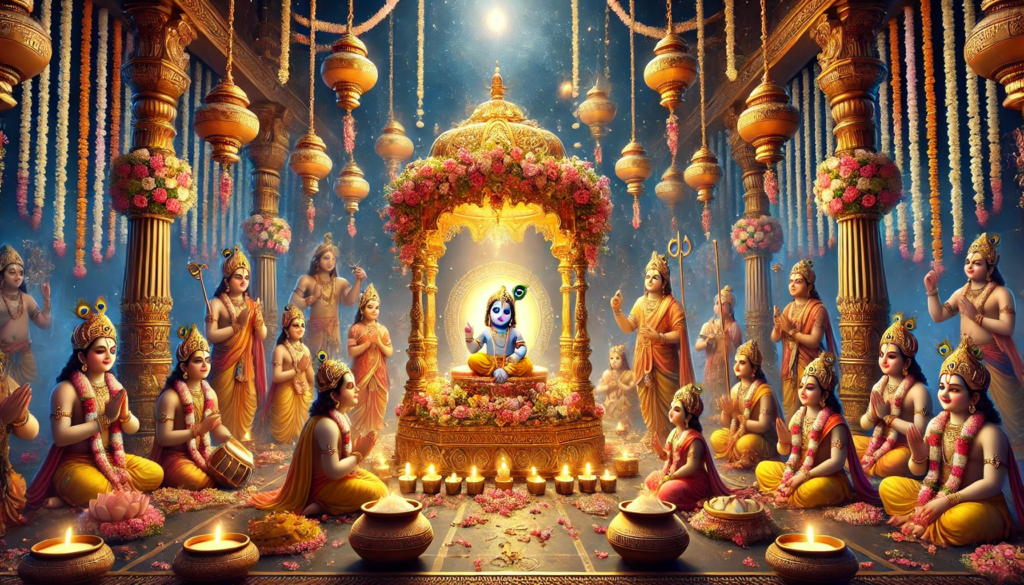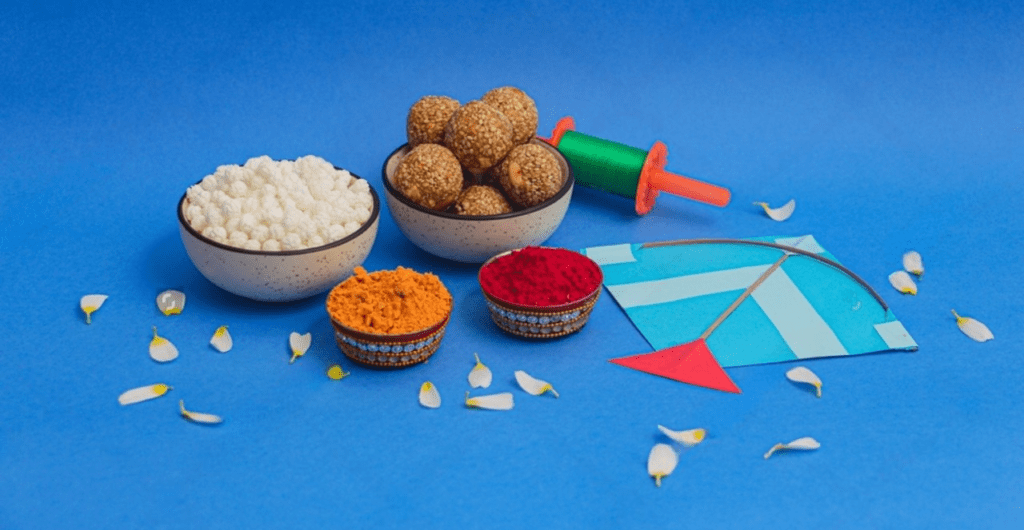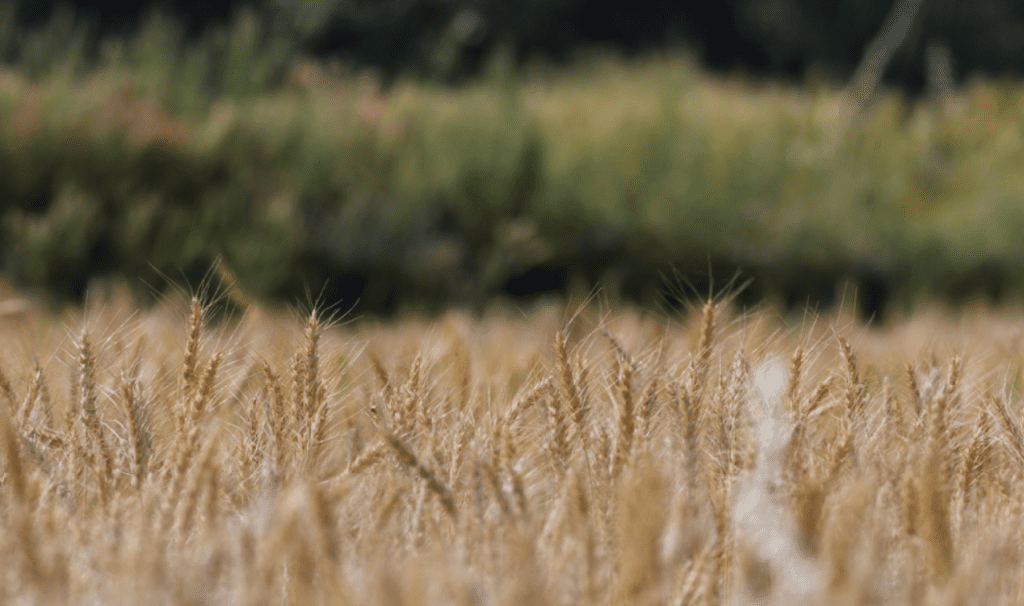At Ridhya Spiritual, we believe that every festival is an opportunity to connect with the divine and deepen our spiritual journey. Among the most vibrant and cherished festivals in Hinduism, Krishna Janmashtami stands out as a joyous celebration of the birth of Lord Krishna, the eighth incarnation of Lord Vishnu. Observed with devotion, fasting, and festivities, this sacred day transcends regional boundaries, uniting millions in love and reverence for the playful yet profound deity. Let us dive into the essence of Krishna Janmashtami and explore its timeless significance.
The Divine Birth: A Tale of Triumph Over Evil
Krishna Janmashtami commemorates the birth of Lord Krishna, an event steeped in mythology and divine intervention. According to ancient scriptures like the Bhagavata Purana, Krishna was born over 5,000 years ago in Mathura to Devaki and Vasudeva. His birth was no ordinary event—it was a cosmic response to the tyranny of King Kamsa, Devaki’s brother, who had imprisoned the couple after a prophecy foretold that their eighth child would end his reign.
As the eighth child, Krishna’s arrival was marked by miraculous occurrences. On the night of his birth—on the eighth day (Ashtami) of the waning moon in the month of Bhadrapada—divine forces intervened. The prison guards fell into a deep slumber, the chains binding Vasudeva unlocked, and the Yamuna River parted to allow Vasudeva to carry the newborn Krishna to safety in Gokul, where he was raised by foster parents, Yashoda and Nanda. This tale of Krishna’s birth is not just a story; it symbolizes the triumph of righteousness over evil and the eternal promise of divine protection.
The Spiritual Essence of Krishna Janmashtami
Lord Krishna is more than a historical or mythological figure—he is a guiding light for spiritual seekers. As an avatar of Vishnu, Krishna embodies love, wisdom, and compassion. His life, from his mischievous childhood in Vrindavan to his profound teachings in the Bhagavad Gita, offers timeless lessons. Krishna Janmashtami invites us to reflect on these teachings: to embrace selfless devotion (bhakti), to act with righteousness (dharma), and to surrender to the divine will.
For spiritual aspirants, this festival is a reminder that the divine resides within us all. Krishna’s playful nature teaches us to find joy in the present, while his wisdom urges us to rise above worldly attachments. At Ridhya Spiritual, we encourage you to use this occasion to meditate on Krishna’s divine presence and seek inner peace.
How Krishna Janmashtami is Celebrated
Krishna Janmashtami is a festival of devotion and celebration, observed with fervor across India and beyond. Devotees begin the day with fasting, often abstaining from food until midnight—the auspicious hour of Krishna’s birth. Temples and homes are adorned with flowers, lights, and intricate jhankis (tableaux) depicting scenes from Krishna’s life.
One of the most iconic traditions is Dahi Handi, especially popular in Maharashtra. Young men form human pyramids to break a pot of curd hung high above, reenacting Krishna’s childhood antics as the “butter thief” (Makhan Chor). This playful ritual symbolizes teamwork, determination, and the joy of connecting with Krishna’s spirit.
At midnight, the air fills with the sound of bells, conches, and devotional songs (bhajans) as devotees welcome Krishna with prayers and offerings of sweets like makhan (butter), mishri (sugar crystals), and peda. The celebrations are a beautiful blend of austerity and festivity, reflecting Krishna’s multifaceted persona.
Regional Flavors of Janmashtami
The beauty of Krishna Janmashtami lies in its diversity. In Mathura and Vrindavan—Krishna’s birthplace and childhood home—grand processions, Ras Leela performances, and temple rituals draw thousands of pilgrims. In Gujarat, devotees pair fasting with Garba dances, while in South India, intricate kolams (rangoli) and recitations of Krishna’s tales mark the day. Maharashtra’s Dahi Handi festivities, meanwhile, bring a competitive yet joyful spirit to the occasion. No matter the region, the essence remains the same: devotion to Krishna.
A Cultural and Spiritual Legacy
Krishna Janmashtami’s influence extends beyond rituals—it has shaped Indian culture for millennia. The festival has inspired countless works of art, from miniature paintings of Krishna’s life to classical dance forms like Kathak and Odissi. His leelas (divine plays) are immortalized in poetry, music, and drama, while the Bhagavad Gita remains a cornerstone of spiritual philosophy.
In today’s fast-paced world, Krishna Janmashtami offers a moment to pause and reconnect. It reminds us that spirituality is not just about solemnity—it’s about embracing life with love, playfulness, and purpose, as Krishna did.
Embracing Krishna’s Message
As we celebrate Krishna Janmashtami, let us imbibe the universal message of this sacred day: to live with joy, act with integrity, and surrender to the divine. Whether you fast, sing bhajans, or simply meditate on Krishna’s flute, this festival is an invitation to awaken the divine within.
At Ridhya Spiritual, we wish you a blessed Krishna Janmashtami filled with love, peace, and spiritual growth. May the melody of Krishna’s flute guide your soul toward eternal bliss.



